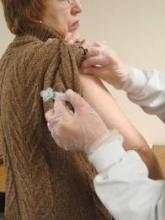SILVER SPRING, MD. – The trivalent and quadrivalent influenza vaccines for the 2014-2015 influenza season in the United States should retain the same strains that are included in the current season’s vaccines, according to a Food and Drug Administration expert panel.
At a meeting, the FDA’s Vaccines and Related Biological Products Advisory Committee voted 16 to 0 that the 2014-2015 trivalent influenza vaccine should retain the three strains included in the current vaccine: an A/California/7/2009 (H1N1)-like virus and an A/Texas/50/2012 (H3N2)-like virus, the two influenza A strains; and a B/Massachusetts/2/2012-like virus, a B/Yamagata lineage strain, as the influenza B strain.
For the quadrivalent vaccine, the panel unanimously recommended that the B/Victoria lineage strain contained in the current quadrivalent vaccine, a B/Brisbane/60/2008-like virus, be retained as the second influenza B strain.
The 2014-15 season will be the second season that quadrivalent influenza vaccines – which contain both a B/Victoria lineage and a B/Yamagata lineage vaccine virus strain – will be available.
During the current season, the quadrivalent vaccine was widely available, according to Sam Lee, Ph.D., senior director of pandemic influenza strategy at Sanofi Pasteur. Dr. Lee, who represented the vaccine manufacturers at the meeting, said that through January 2014, about 134 million doses of influenza vaccine were distributed in the United States, about the same as during the 2012-2013 season. The quadrivalent vaccine accounted for about 20% of the total vaccine doses distributed, and is expected to account for more than half of the doses distributed during next season, he said.
So far, influenza vaccine manufacturers do not anticipate any problems with the availability of the strains to be included in the vaccines, Dr. Lee told the panel.
Providing an update on influenza activity during the current season, Dr. Lisa Grohskopf, of the influenza division in the Centers for Disease Control & Prevention’s National Center for Immunization and Respiratory Diseases, said that influenza activity peaked in late December and early January and that influenza A (H1N1) viruses have predominated. As of Feb. 15, there have been 52 influenza-associated pediatric deaths reported, which is less than the number reported last season (171) but more than during the 2011-2012 influenza season (35), she noted.
The FDA panel meets at the same time each year to review influenza surveillance and epidemiology data in North America and globally, antigenic characteristics of influenza virus strains currently circulating in human populations, and serologic responses to circulating influenza viruses of people immunized with the current approved vaccine.
The panel’s recommendations are the same as the World Health Organization’s recommendation for next season’s northern hemisphere influenza vaccine, which was made the week before the FDA meeting.
The FDA usually follows the recommendations of its advisory panels. Panelists have been cleared of potential conflicts of interest related to the topic of the meeting. Occasionally, a panelist may be given a waiver, but not at this meeting.


